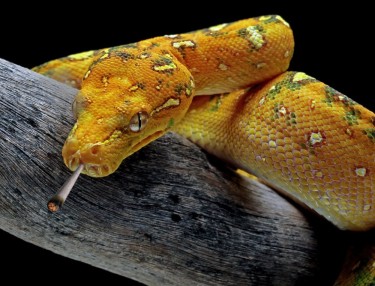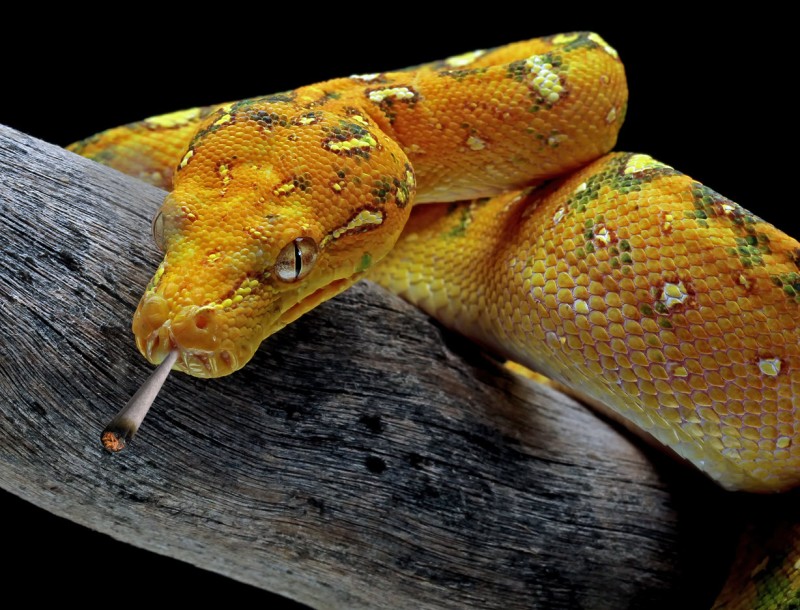
Brazil is home to some of the deadliest snakes in the world. The infamous snake island in Brazil contains several snakes that belong to the Bothrops genus, and these snakes are responsible for about 85% of the total snake bite cases recorded in Brazil.
For several decades researchers have focused on discovering anti-venoms for some of the venomous bites that can be gotten from the Bothrops snakes. Snake Island is visited by these scientists to learn more about the snakes in this genus, and over the years significant progress has been made in formulating anti-venoms.
Terpenes and Testing recently published a study that investigated the therapeutic effects of cannabis on inflammation due to venom-inducing bites from the Bothrops moojeni snakes, popularly known as Brazilian lancehead pit vipers.
The experiment was conducted on Wistar rats. The rats were infected with B. Moojeni snake venom to induce inflammation. Cannabis seed fixed oil (CSO) and a nano-emulsion of it were thereafter administered to the little animals and the reactions that followed were observed.
Brazilian Lancehead Pit Vipers
Scientific name: Bothrops moojeni
These species of Bothrops snakes which are found in South and Central America are highly venomous. They mostly inhabit the riparian forest in Brazilian states like Bahia, Goias, Mato Grosso, Mina Gerais, São Paulo, Tocantins, Parana, and Piaui—These regions are referred to as the Brazilian Cerrado Biome.
Young Bothrops moojeni snakes can be identified by their whitish to yellowish tail tips. During this early stage of their life, they present caudal luring behaviors. In their Juvenile phase, these reptiles feed on little ectotherms, mainly frogs and toads. As they progress in age, their diets shift to include small rodents and their tail tips become darker over time.
The Brazilian Lancehead bite delivers a hardy venom that contains an assortment of poisonous compounds which function synergistically and cause the victim to experience profound tissue damage around the injury site, myonecrosis, inflammation, and even hemorrhages.
Ophidian accidents by the Brazilian lancehead pit vipers now pose a serious health risk to the Brazilian population, mostly due to the multiple-organ failures associated with it.
Researchers have limited their studies to mitigating one of the venom effects of the Bothrops moojeni bite. Headway had been made in discovering anti-inflammatory compounds which are capable of reducing the effects of the venom.
Details Of The Study
The scientists obtained the venom from a living B. moojeni and lyophilized the sample.
Lyophilization is a scientific preservation method in which an obtained sample is dried without destroying its physical structure. The material is then frozen and later warmed in a vacuum to ensure the ice sublimes. Lyophilization is mainly carried out on blood plasma, tissues, and pharmaceuticals.
The lyophilized sample was dissolved in a 0.9% saline solution and it was inoculated into the selected Wistar rats.
Following the inoculation, venom-induced symptoms like edema, granulomatous tissues, peritonitis, and partial damage to the gastrocnemius muscle.
For the treatment phase, the rats were split into five groups.
Four of which were for experimental purposes, and the last served as the control group.
One group was given dexamethasone. This treatment is a glucocorticoid effective which is used to reduce the venom-inflammation effects in the rats. Two groups were administered with Cannabis seed fixed oil (CSO). The quantity of the CSO given was in 200 mg/kg and 400 mg/kg doses respectively. The fourth group was treated with a nano-emulsion (NCS) dose of 100 mg/kg. The control group was administered 4% polysorbate 80 solutions.
All treatments were given orally.
Why Cannabis Seed Oil (CSO)?
Cannabis Seed fixed oil, also called hemp seed oil, is obtained from cannabis seeds. The process includes crushing and pressing the cannabis seeds to extract the oil.
CSO contains polyunsaturated fatty acids which are linoleic and linolenic, both alpha and gamma isomers.
It is also rich in unsaturated fatty acids like omega-6 and omega-3.
The above compounds have nutritional properties, but for this experiment, they were considered for their anti-inflammatory capabilities.
Other established health benefits of cannabis seed oil include; treatment of skin conditions like acne and psoriasis, lowering blood pressure to promote the heart's health, and it serves as natural pain relief when applied to painful areas.
Nano-emulsion of Cannabis Seed Oil
This is a kinetically stable emulsion that has tiny suspended droplets with diameters ranging from 20 nm to 400 nm. These nano-emulsions are used in the cannabis industry to create diverse products.
When selecting nanoemulsions for this experiment, the researchers considered its added benefit of improving cannabinoid bioavailability through enhanced water compatibility. In addition to this, it has been observed that when cannabis seed oil is delivered as a nano-emulsion, it has a significantly improved bioavailability and penetration capability of cell membranes. The scientists noticed an increased water solubility and controlled release when using nano-emulsions.
All these made it suitable to be used as a technique to enhance the pharmacological effect of Cannabis seed oil on the resulting inflammation that occurs after a Bothrops moojeni snake bite.
Observed Reactions
It was observed that the groups who were being treated with cannabis seed fixed oil (CSO) and nano-emulsion NCS had a significant reduction in the rate at which the edema and granulomatous tissue were being formed. This was attributed to the therapeutic effect of the administered treatments in the rats which significantly reduced the production of eicosanoids, leukocyte recruitment, and proinflammatory cytokines.
All these greatly lowered the inflammatory reaction in the venom-induced leukocyte infiltrate and peritonitis.
Conclusion Of The Study
The results obtained from this experimental study substantiates the hypothesis that cannabis seed oil can be used to treat venom-induced inflammation. Brazil is fast tracking cannabis legaliation for 2022.
Final Note
We are still at the beginning phase for developing an anti-venom for Brazilian lancehead pit vipers. A Lot of tests and experiments still have to be carried out to fully confirm the effectiveness of cannabis-derived fixed oil, as well as the significance of the nano-emulsion technique in treating venom-induced inflammation for the B. moojeni snakes.
Who knows, maybe with one snake antivenom at a time, Brazil's snake island will look less like a death sentence to tourists, researchers, and others all over the world.







